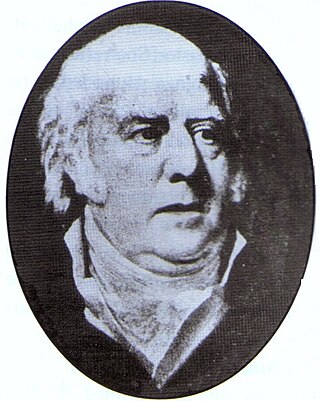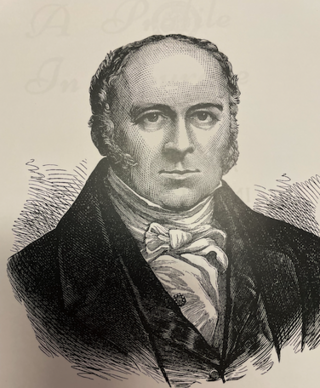James Kirkpatrick | |
|---|---|
 | |
| Died | 1743 |
| Nationality | Irish |
| Occupation | Presbyterian minister |
James Kirkpatrick (died 1743) was an Irish Presbyterian minister.
James Kirkpatrick | |
|---|---|
 | |
| Died | 1743 |
| Nationality | Irish |
| Occupation | Presbyterian minister |
James Kirkpatrick (died 1743) was an Irish Presbyterian minister.
Kirkpatrick was the son of Hugh Kirkpatrick, who was minister successively of Lurgan, co. Armagh, Ireland, Dalry and Old Cumnock in Scotland, and Ballymoney, co. Armagh (where he died in 1712). He was probably born in Scotland while his father was minister there. In February 1691 he matriculated from the university of Glasgow, and in February 1694 his name appears in the university list of students in theology. On 7 August (probably) 1699 he was ordained as minister of the congregation of Templepatrick, co. Antrim. The well-known ‘Belfast Society,’ which exercised an important influence on the ecclesiastical affairs of the north of Ireland, was founded in 1705, and Kirkpatrick was one of its earliest and most influential members. In 1706 he resigned his charge at Templepatrick on receiving an invitation from the presbyterian congregation in Belfast to take the place of their minister, John McBride, who had been obliged to retire to Scotland owing to his non-abjuring opinions. Soon afterwards the congregation divided on account of its numbers, and he became minister of the second congregation, a new meeting-house having been built close to the first. In 1712 he was elected moderator of the synod of Ulster. In 1720 he came prominently into notice as one of the leaders of the non-subscribing party in the north of Ireland. In 1725 he was placed with the other non-subscribers in the presbytery of Antrim, which the synod in 1726 excluded from its judicatories. In his later days he took the degree of M.D., and combined the practice of a physician with the work of a clergyman. He is said to have died suddenly in Dublin, where he had gone on business with his wife. The date of his death is usually given as 1744, but a notice by James Blow, prefixed to Kirkpatrick's posthumous ‘Defence of Christian Liberty,’ shows that he died in 1743. A copy of his portrait is in the vestry of the first presbyterian church in Belfast.
Kirkpatrick is best known by his ‘Historical Essay upon the Loyalty of Presbyterians in Great-Britain and Ireland from the Reformation to this present year 1713, &c.’ (4to, pp. xv, 564, and index of ten pages, no place or printer's name, 1713), a work undertaken to meet the desire of the general synod to possess a history of their church, and specially called for by the persistent attacks of Tisdall, vicar of Belfast, on the presbyterian body. It preserves many valuable facts and documents, and gives a good idea of the state of public sentiment in Ireland in the days of Queen Anne. It was published anonymously. Kirkpatrick also wrote:

The Non-subscribing Presbyterian Church of Ireland is a non-creedal Christian denomination, which maintains a great emphasis on individual conscience in matters of Christian faith.

John Abernethy was an Irish Presbyterian minister and church leader, the grandfather of the surgeon John Abernethy.
James Bryson was an Irish Presbyterian minister.
James Seaton Reid MA DD (1798–1851) was an Irish presbyterian minister and church historian.
William Boyd, was an Irish Presbyterian minister. He is known as the bearer of a petition to Samuel Shute, the governor of Province of Massachusetts Bay, embodying a proposal for an emigration from County Londonderry to that colony. Boyd fulfilled his mission in 1718; the intended emigration did not take place. In the same year, James McGregor, who had not signed the document, emigrated to New Hampshire with some of his people and founded a town to which was given the name of Londonderry.
James Duchal, D.D. (1697–1761) was an Irish Presbyterian divine.
John Cameron (1724–1799), born near Edinburgh, was a Scottish Presbyterian minister, active in Ulster.
John Bankhead (1738–1833), was an Irish presbyterian minister.
Samuel Haliday or Hollyday (1685–1739) was an Irish Presbyterian non-subscribing minister, to the "first congregation" of Belfast.

William Steel Dickson (1744–1824) was an Irish Presbyterian minister and member of the Society of the United Irishmen, committed to the cause of Catholic Emancipation, democratic reform, and national independence. He was arrested on the eve of the United Irish rising in his native County Down in June 1798, and not released until January 1802.
Josias Welsh was one of the early Scots ministers who settled in Ulster in the 17th century. He was deposed for his adherence to Presbyterian principles. He was related to many other famous Presbyterian preachers being the grandson of John Knox, the son of John Welsh of Ayr, and the father of John Welsh of Irongray.
James Bruce was an Irish Presbyterian minister, the eldest son of Michael Bruce. He was minister of Killeleagh, County Down in 1684; but fled to Scotland in 1689; returned to Killeleagh in 1692, and founded a Presbyterian college there in 1697. He joined the subscribers to the Westminster Confession in 1721, but was tolerant to the non-subscribers.
Samuel Martin Stephenson was an Irish presbyterian minister and physician.

Henry Montgomery was an Irish Presbyterian minister.
John Malcome was a British Presbyterian polemic.
William Campbell was an Irish Presbyterian minister.
William Bryson was an Irish Presbyterian minister.
Fletcher Blakely was an Irish non-subscribing Presbyterian minister.
William Bruce was an Irish Presbyterian minister and professor.
John McBride was an Irish minister of the Presbyterian General Synod of Ulster and religious controversialist.
![]() This article incorporates text from a publication now in the public domain : Hamilton, Thomas (1892). "Kirkpatrick, James". In Lee, Sidney (ed.). Dictionary of National Biography . Vol. 31. London: Smith, Elder & Co.
This article incorporates text from a publication now in the public domain : Hamilton, Thomas (1892). "Kirkpatrick, James". In Lee, Sidney (ed.). Dictionary of National Biography . Vol. 31. London: Smith, Elder & Co.